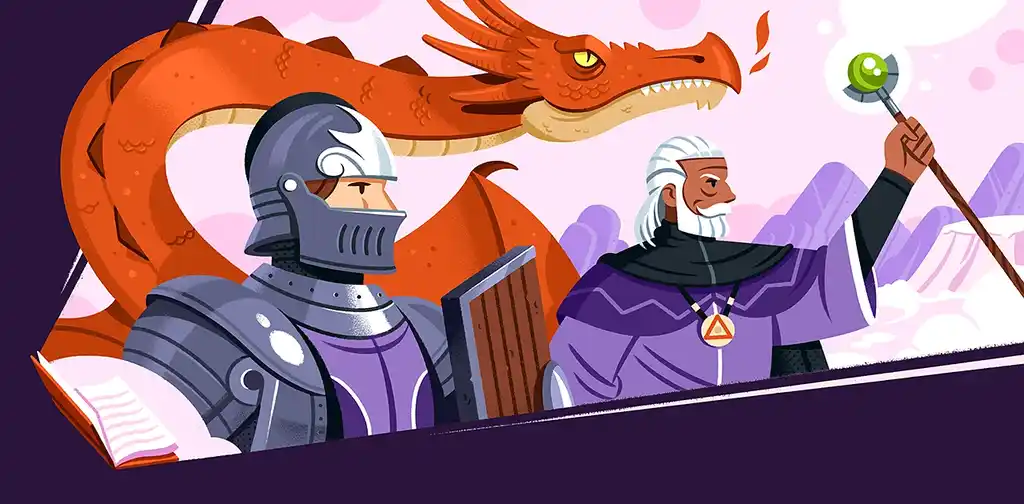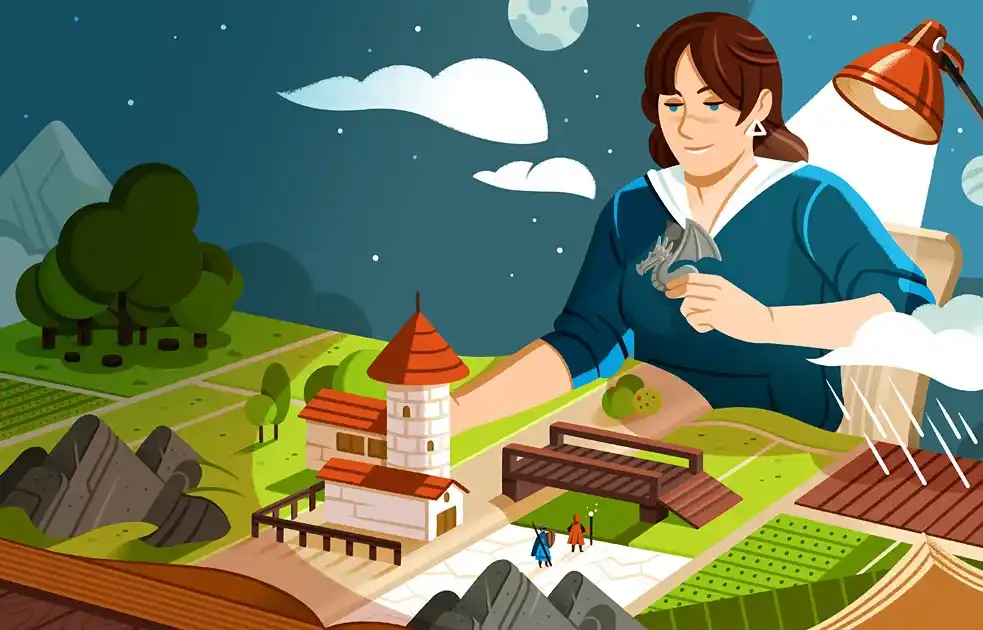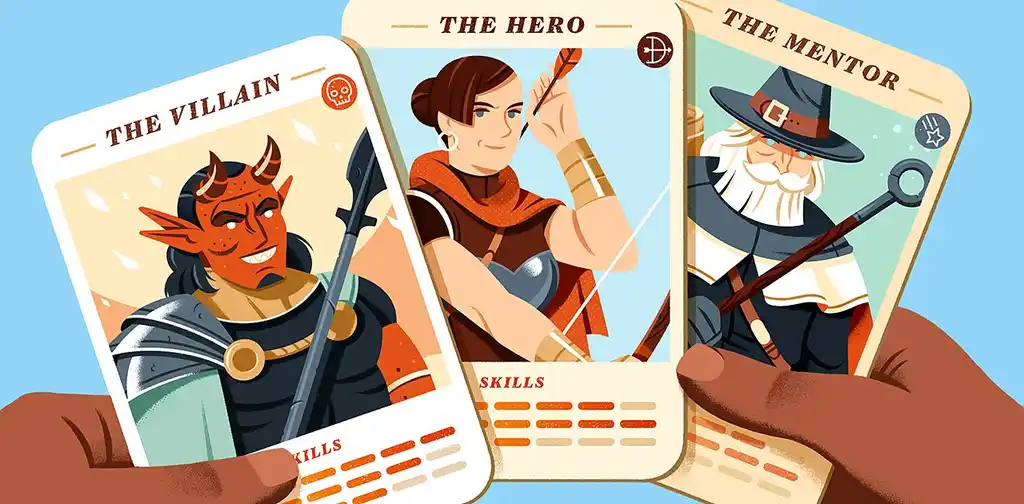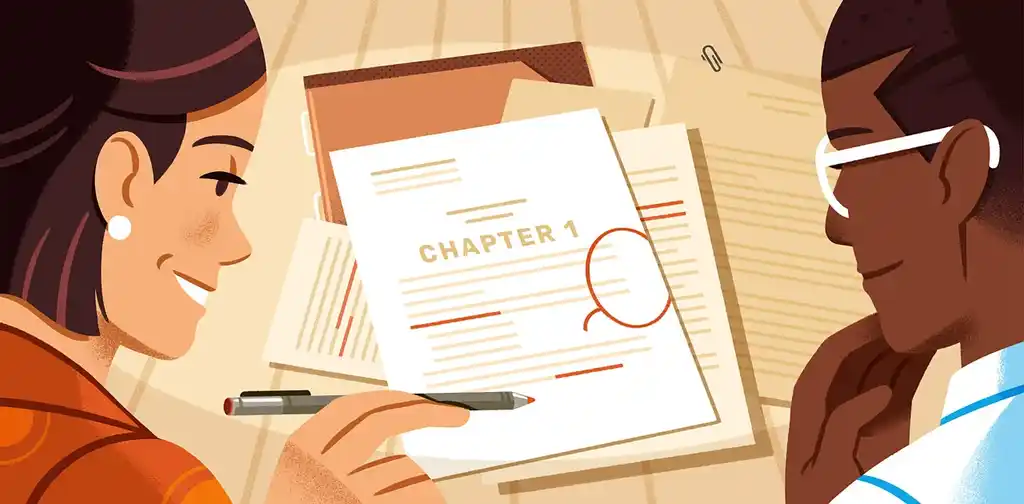Last updated on Mar 20, 2024
How to Write a Fantasy Novel (+ Worldbuilding Template)
For writers who long to create epic stories, unforgettable characters, and sprawling imaginary lands, there’s no better genre choice than fantasy. Particularly for those who have always loved reading fantasy, writing your own novel could be the culmination of all those magical adventures!
And who better to guide you through the process than some of the best fantasy writers and editors in the industry? For this post, we’ve consulted masters of the realm (so to speak) who have worked with George R. R. Martin, Brandon Sanderson, James Dashner, and more.
How to write a fantasy novel from start to finish:

FREE COURSE
How to Write Fantasy Fiction
Learn to combine worldbuilding, plot, and character to create literary magic.
1. Read all the fantasy you can
If you’re looking to write in this genre, you’ve likely read quite a bit of it already. But in order to succeed in your quest, you’ll have to read (or reread) even more!
Chersti Nieveen, an editor who has worked with bestselling authors like Brandon Sanderson, suggests picking 5 to 10 of your favorite fantasy books and tackling them with an eye for their strongest elements. This will help you absorb ideas not only for plot and character, but also for structure, descriptive techniques, dialogue, and more.
“Read the books that are classics. They are classics for a reason,” Chersti advises. “But also read the books that are bestsellers and the books that are award winners. Read and read and read, and you'll start to see your own writing improve.”

Start by reading your favorite tales of wizards, dragons, and more. Art by Veronica O’Neill.
Focus on your niche
Need help narrowing down your reading list? Try reading only within your own subgenre of fantasy for a spell (no pun intended)!
For example, if you’re writing a “sword and sorcery” fantasy, you might study Michael Moorcock’s Elric sequence, Karl Edward Wagner’s Kane series, and Charles R. Saunders’ Imaro. Or if you want to write a “portal” fantasy in which characters are transported to another world, you might revisit classics such as Alice's Adventures in Wonderland or The Chronicles of Narnia to mull over how that magic works.
For even more subgenre-specific recommendations, check out these posts:
- 26 Grimdark Books to Make You Shiver
- 20 Highly Addictive Urban Fantasy Books
- 25 Steampunk Titles That Define the Genre
- 30 Best YA Fantasy Books for Teens
2. Build your book’s fantasy world
A strong setting is crucial to any good work of fiction, and perhaps in fantasy most of all. It must be distinctive enough to draw readers into the story, but not so elaborate as to confuse them.
The first thing to consider is whether your novel will take place in our world (often referred to as “low fantasy”) or in a different world (“high fantasy”). The Harry Potter series, for example, takes place in a version of our world: witches, wizards, and magical creatures exist alongside Muggles like ourselves. The Lord of the Rings, meanwhile, is set in an entirely separate world with its own made-up lands, languages, and more.

Next up, build out the landscape of your fantasy world. Art by Paolo P.
Figure out what sets your world apart
After all that reading, you should have plenty of worldbuilding inspiration — but you also don’t want your book to read like a copy of someone else’s.
“You want to be original, so ask yourself: what sets my world apart?” says Alex Foster, a Reedsy ghostwriter who’s penned eight bestsellers.
To get you started, think about the following aspects of your world:
- How did this world come to be, both historically and in its current form?
- What are the limitations of its magic — physical, moral, or otherwise?
- Purely in terms of aesthetics, what do its various settings look like?
For even more thought-provoking prompts to help flesh out your fantasy world, download our ultimate worldbuilding template below!

FREE RESOURCE
The Ultimate Worldbuilding Template
130 questions to help create a world readers want to visit again and again.
Write down your rules
With the creation of a new world also comes the creation of all its internal logic and magic systems. True, fantasy should serve as an escape from dreary bureaucracy — but you still need to lay down the law about your world, otherwise people won’t take it seriously.
“I often see first-time fantasy writers breaking their own rules, and it really takes the reader out of the story,” says Jenny Bowman, a Reedsy editor who worked on Robert Beatty’s MG fantasy novel Serafina and the Black Cloak.
To combat this, she suggests writing down a reference list of rules so you don’t forget them: “When do the suns come up? Can only children under the age of 10 fly? When casting a spell, does it transform the object or create an object from nothing?”
“Know the rules of your world (what we call physics in the real world) when you're writing fantasy and don’t break them — unless you’ve thought a great deal and it’s intentional.”
3. Create series-worthy characters
Now that your world is established, it’s time to populate it with sparkling characters (perhaps literally, depending on your lore). No matter how great your world is, don’t just throw in some stock characters and call it a day!
Dynamic characters with clear goals
“The best characters are complex and original,” notes ghostwriter Alex Foster. “They possess realistic motives and weaknesses, and they change over time due to events and supporting characters in the story.”
In other words, great characters — and certainly great protagonists — should be dynamic, meaning they undergo internal change as the story progresses. This is typically an evolution in their beliefs and values, often to the extent that their whole perspective shifts.
What sets them on this journey? A clear set of character motivations: whether related to their personal growth, resolving external conflicts, or saving the world. In fantasy, “big” character motivations tend to fall into that last category — but make sure to give your characters “small” motivations as well to keep them well-rounded and move the story along!

Your characters should be vivid, complex, and motivated in their actions. Art by Anna Arkhipova.
The character development process
As with worldbuilding, the more deeply you contemplate your character(s) at the outset, the stronger they will be in your novel.
Alex suggests “interviewing” your main character as a useful tactic. “What do they fear most? What are their goals? What are they willing to do to achieve these goals? Do this with all your characters when you're writing fantasy: craft a questionnaire and get your answers from them.”
Editor Jenny Bowman actually encourages writers to develop characters through short stories first. This process of working out the details, she says, “gives you the freedom to create a new universe with no boundaries.”

FREE RESOURCE
Reedsy’s Character Profile Template
A story is only as strong as its characters. Fill this out to develop yours.
Regardless of your methods, you should have a good amount of material for your world and characters before moving on to the next step: the plot.
4. Plot a story that comments on the real world
As you outline the beats of your novel, remember that great fantasy plots don’t just deliver dramatic twists, but also draw compelling parallels to the real world. Take an epic political fantasy like A Song of Ice and Fire, or even a short story like “The Ones Who Walk Away from Omelas” by Ursula K. Le Guin — at the core of these plots is some kind of real-world issue.
Think about issues that are important to you
According to Rebecca Heyman, a Reedsy editor who has worked with popular fantasy authors such as Elise Kova, writing fantasy can be a great outlet. “Your concerns about politics, culture, the environment, technology, violence, racism, misogyny — these issues can be explored in inventive, eye-opening ways while writing fantasy.”
“Carry On by Rainbow Rowell does this brilliantly. There are undercurrents of identity politics explored there, with deep characterization that merges meaningfully with the fantastical elements of the text.”
Indeed, the next step of the plotting process is to…
Intertwine key plot points with fantasy

Each major plot point of your story should have a healthy dose of magic. Art by JC Pouzols.
Next, you’ll determine exactly how magic will play into your book’s plot — then use it to build out those crucial parallels.
For example, in The Lord of the Rings, the One Ring symbolizes the hypnotic, destructive influence of power. While Tolkien denied that the story was an allegory for anything specific, the plot speaks for itself as a metaphor for power, showing how absolute power can corrupt absolutely.
To sample a few plot points from The Fellowship of the Ring:
- Frodo inherits the magical One Ring. Gandalf, who has been around long enough to understand its danger, tells him to remove it from the Shire.
- On their journey, Frodo and his friends are pursued by the wraithlike Black Riders. These riders are later revealed to be men who used the other Rings of Power to gain immortality but now find themselves helplessly enslaved.
- After Frodo falls under the Ring’s spell, he uses it to turn invisible and flee. Sam, who remains pure of heart and intention, follows him… in part to ensure that the Ring does not overtake Frodo entirely.
These key beats — and the One Ring’s role within them — demonstrate how you might connect fantasy and reality in your own story.

FREE RESOURCE
Fantasy Novel Outline Template
Craft an out-of-this-world novel with our step-by-step template.
5. Write a draft full of compelling detail
Another classic Tolkien move is to spare no detail in your writing. But don’t forget that vibrant, in-the-moment details are just as important (if not more so) as backstory!
Ground readers with sensory details
Reedsy editor Erin Young, who worked on James Riley’s Story Thieves series and James Dashner’s Maze Runner series, reminds authors that they should show, not tell in a fantasy draft. “Don't just tell your reader the basics of your world. Instead, give them scenery when it relates to the story by getting your characters to interact with their surroundings.”
Michelle Hope, an editor who has worked with George R. R. Martin and Blake Crouch, couldn’t agree more — and notes that Martin is particularly skilled at this tactic.
“Crisp air, hooves clattering on ironwood planks, a warm tongue, women’s perfume, summerwine, soft fur. [Martin’s] writing is full of these concrete, real-life details… and when a reader can viscerally inhabit your world, they won’t question it when you introduce the fantastical into your story. They’ll just take your word for it.”

Sensory details like the gnarled bark of a tree, a dreamy pink sky at twilight, and newly cast spells shimmering in the air will help immerse readers in your story. Art by Josh Tufts.
Don’t info-dump
Some of the greatest fantasy writers of the 20th century were occasionally guilty of info-dumping. As editor Chersti Nieveen notes, with readers’ attention spans getting shorter and shorter, it’s best to avoid expositional overload if possible.
“Fantasy writers often try to introduce too many characters on one page, or there’s an info dump to reveal how the magic system works. Pages and pages before they even introduce the story… and you end up dropping readers that way.”
6. Get feedback from fantasy experts

If you’ve completed a draft full of brilliant worldbuilding, dynamic characters, and insightful commentary, well done! However, seeking a second opinion at this point can also be very helpful.
Seek casual test readers first
Sometimes the best beta readers are the people you already know — family, friends, and acquaintances who enjoy fantasy and are willing to give your novel a look.
If you’re not sure whom to ask, you could always check out a fantasy-friendly writing community or critique circle, like the online SFF Chronicles forums or the Critters workshop run by the Science Fiction and Fantasy Writers Association.
Work with an experienced fantasy editor
That said, if you’re serious about improving your novel, you should really be working with a professional fantasy editor. An editor can offer incisive, experience-based feedback that will bolster not only your writing, but potentially your book sales as well.

MEET EDITORS
Polish your book with expert help
Sign up, meet 1500+ experienced editors, and find your perfect match.
7. Publish your fantasy masterpiece
Having edited your book into its best possible form, there’s only one thing left to do: get it traditionally published, or publish it yourself on a platform like Amazon KDP.
The wonderful thing about fantasy is that its readers have a nearly infinite appetite for the genre, so you can’t really go wrong either way. The previously linked posts are detailed, step-by-step guides on traditional publishing and self-publishing, but here are a few more resources to help:
- 100+ Literary Agents Seeking Fantasy Submissions
- The Ultimate Fantasy Book Title Generator
- Fantasy Name Generator for Elves, Dragons & More
- The Best Fantasy Book Publishing Companies
Best of luck on your hero’s journey — and remember to avoid cursed jewelry at all costs! 💍









16 responses
T.L. Branson says:
01/09/2017 – 05:36
I'm doing #2 right now. I totally get it. Writing short stories has helped me tremendously in understanding some fuzzy characters who have been more in the background in my main novel. Writing their story out helps me mold them a little better and write a real person instead of just a cardboard cutout.
↪️ jennyb_writes replied:
05/09/2017 – 23:29
Awesome!! I have worked with authors who have taken this step and those who haven't - I can always tell the difference. Way to go!
Lady Adellandra Dratianos says:
03/09/2017 – 23:48
I started my series "Chronicles of the Dragon Nations" by introducing a lot of people at once in the very first drafts years ago. Now, I introduce wherever they show up, but once. If it's been twenty or so pages since the introduction, I summarize who they were, either by dialogue between two characters or by reiterating who they were. Another rule from above that I use is the "Don't break your own rules." i.e. In my books, those in the Mortal Realm cannot shift or fly, due to gravity and the laws of nature. I had to remind myself this when I had three characters from another land, shapeshifters from the Dragon Nations are able to shift. Once reading it over for edits, I remembered my Mortal Realm rule and changed it. Lady Adellandra www.amazon.com/author/ladyadellandra
↪️ jennyb_writes replied:
05/09/2017 – 23:32
Don't break your own rules is a tricky one...way to go catching your mistake in rewrites! Sometimes those laws of nature are so subtle and it always pays to pay attention in rewrites and edits. Happy writing!
Omnipleuvre says:
16/01/2018 – 20:53
One thing I've seen a lot, even in published books, is the description featuring waaaaay too many names at once. I should be able to grasp the premise of your story without needing to know that Adriana, heir to the Kingdom of Tallyrand is about to cross the Wall of Gishegrunurman to search for the amulet of Kinscaer. Too many names all at once is almost as bad as an infodump I feel.
Jenna Hunter says:
27/03/2018 – 20:53
It was interesting to read that the environment can be a plot point in a fantasy book. I think that making a lot of detail in a book is really important. I love reading books that create an entire universe, especially full of dragons, dwarves and all kinds of mythical creatures. http://crimsonthedragon.com/
Rishabh Chaturvedi says:
31/05/2018 – 18:49
How do I make my world different from the ones that influenced me to write a fantasy novel??
Janice Swanson says:
28/11/2018 – 12:59
What a wonderful article! Once I dream about how to create its fantasy the world, write a large number of books about this world, and I hope that once on my books based the film. All of the above items are really important to know the novice writer. Point # 13 is especially important for me, because the idea to write a book came to me after I was inspired by the works of Tolkien and George Orwell. These writers have their own inimitable style, and each of their stories makes me think about a lot. I would really like to write a novel, and to get it in a new genre, it will be something between fantasy and anti-utopia novel. Thank you for sharing such interesting and useful articles.
Anna says:
25/02/2019 – 11:17
A very interesting article, I learned a lot of new things for myself, which I hadn’t thought about before, but unfortunately not all the tips are applicable at the moment to modern works. The market is overcrowded with a variety of short-growing love stories, psychology and other tinsel. Now there is not enough quality fiction, but what appears is read immediately and very quickly. I strongly advise you to read a series of books about the Witcher, insanely interesting books, I just could not tear myself away for several months. If you want to know more about fiction, then examine this link.
Someguy says:
31/05/2019 – 13:35
"...and no-one would instinctively group Harry Potter and Stephen King's The Dark Tower in the same category." FYI. A relic from Harry Potter's world actually appears in the Dark Tower. While not in the same category, it easily can convince a reader of Harry Potter to read The Dark Tower or vice versa. It's a bit of a unique relationship.
↪️ Nick replied:
17/06/2019 – 12:00
Also, bogarts are based on It/The Spider/whatever species it is. And while she(Pennywise is just one form and a female spider is its true form) only kind of appears in TDT, there's a character in the series that's the same species I do believe
Nick says:
17/06/2019 – 12:02
I absolutely hate short stories. I can't write that little!
Elijah says:
25/06/2019 – 21:24
I’ve been working on a 5 book story for about 15 years now. I took several writing classes and have become so self critical of my writing that it has been hard to progress. I also lost a lot of my original papers due to mice (I found it easier to write by hand). These tips definitely make me feel like I’m on the right path lately.
Joseph Smith says:
07/11/2019 – 07:30
I'm currently on the third chapter of a book that I hopefully will actually complete, and so far I have stuck to most of these rules (high fantasy, sword and sorcery/heroic fantasy with a touch of dark fantasy), with the only two I haven't done as of yet is re reading lotr and creating a character interview (I have made a DnD character sheet of him if that counts). The kind of story I'm going with (not going to go too far into it) is a paladin raised from the dead only to have magic that he doesn't understand return some form of life to him finds a new purpose in hunting down undead and returning them to the afterlife. Any advice I can get?
William Anthony Pitzer says:
07/11/2019 – 22:01
The issue I have with number 2 is that I generally hate short stories, so obviously I'll find it difficult to write them. If a story is too short, then it's impossible to flesh out characters and a world tremendously, which is the whole reason that I read fantasy to begin with.
Matthew R Bishop says:
14/02/2020 – 18:39
Thank you! Rewriting like eight books because of this article, ugh. But thank you ;)